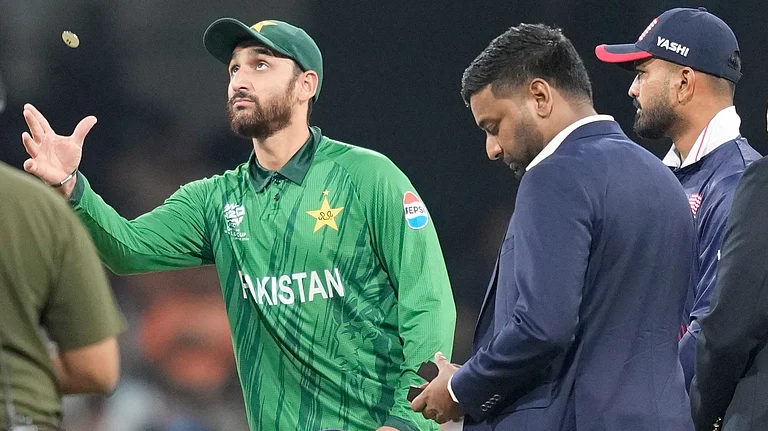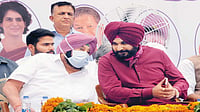On March 27, as he campaigned in various assembly constituencies across Kerala, Rahul Gandhi made a scheduled stop to offer prayers at the Lord Ayyappa Dharma Sastha temple and the adjoining Vavar mosque in Kottayam’s Erumeli town. Later, addressing a public gathering, the former Congress president declared: “In Erumeli, people who go to temples respect Muslims, and the Muslims who go to mosques respect Hindus. That is the Indian tradition. However, the BJP and the RSS are trying to create cracks in this great tradition by instilling communal hatred among people.”
The BJP’s alleged attempt to create religious polarisation for winning elections is a recurring theme in the Congress’s campaigns in poll-bound Kerala, Tamil Nadu, Assam, West Bengal and Pondicherry. That the BJP has had vast swathes of India’s electorate inebriated on a dizzying cocktail of religious fervour, jingoistic paroxysm and misanthropic rage, all camouflaged with a deceptive twist of social justice, is a charge that Rahul, his sister Priyanka Gandhi Vadra and other Congress leaders repeat wherever they campaign. Yet, not so long ago, the Congress too was on an overdrive emphasising Rahul’s Hindu identity. Ahead of the 2017 Gujarat assembly polls, chief party spokesperson Randeep Surjewala described his leader as a janeu-dhari Hindu, and during the 2018 assembly polls in Madhya Pradesh and Rajasthan, Congress workers put up posters hailing Rahul as a ‘Shiv bhakt’.
These assertions of Rahul’s religious credentials coincided with the Nehru-Gandhi scion’s highly publicised visits to temples across poll-bound states even as his party remained silent on BJP-led governments in states that saw recurring hate crimes against Muslims. By the 2019 Lok Sabha polls, the Congress’s brazen display of Rahul’s Dattatreya Brahmin identity and its silence on the BJP’s alleged anti-Muslim nature had revived criticism of the grand old party peddling “soft Hindutva”. The elections made it abundantly clear that the voters rejected the Congress and Rahul’s pitch of being “better Hindus”.
ALSO READ: A Battle For The Hindu Mind
“The whole projection of Rahul as a better Hindu and thus a superior alternative to Narendra Modi was a huge blunder,” says a Congress leader. “The Congress always stood for pluralism and whenever we tried to appease one community or the other, it only backfired. This was evident after the Rajiv Gandhi government overturned the Shah Bano judgment to win over Islamic fundamentalists and later when Rajiv paved the way for shilanyas at the Ram Mandir site in Ayodhya to win over Hindus.”
ALSO READ: God Finds Place In Own Country
Congress sources say the party has tried to make a course-correction following the 2019 Lok Sabha debacle, even though it is still struggling to settle internal feuds due to a continuing leadership vacuum following Rahul’s resignation as the party president. “Irrespective of the poll outcome, if you see our campaigns in the elections that followed the Lok Sabha polls (Haryana, Maharashtra, Bihar, Jharkhand and Delhi), there has been a change. Yes, Rahul and Priyanka may still be visiting temples in Assam and Kerala, but these aren’t projected as the main events on their campaign itinerary,” says a party veteran.
ALSO READ: Sharp End Of A Poll Spear
The Congress is also belatedly realising that its silence on problems faced by Muslims due to ascendant Hindutva politics is alienating the community further, pushing it towards parties like Asaduddin Owaisi’s AIMIM, as the Bihar assembly results showed. “We are fighting against communal polarisation,” says Tariq Anwar, the party’s in-charge for Kerala. “The BJP has wreaked havoc on religious minorities, particularly Muslims, in the past seven years. The Congress promises to heal these scars. Our stand against the Citizenship (Amendment) Act, through which the BJP wants to target Muslims, is evidence of this.”
The party’s reticence in openly allying with Muslim organisations for fear of the BJP exploiting Hindu sentiments and benefiting from the resultant religious polarisation too has ebbed. The Congress’s old alliance with the IUML in Kerala has remained intact in the ongoing assembly polls. The party has also struck alliances with Badruddin Ajmal’s AIUDF in Assam and controversial Islamic cleric Abbas Siddiqui’s ISF in Bengal. These alliances have attracted scathing criticism from the BJP, with Himanta Biswa Sarma declaring that the Congress-AIUDF alliance has led to polarisation in Assam. “It’s rich of the BJP to say we are polarising Assam through our alliance with the AIUDF after what the Modi government has done to the state through CAA,” retorts Congress MP Gaurav Gogoi.
ALSO READ: Mughal, Miya And Oxomiya
The BJP’s leading lights are now canvassing for a mandate against illegal immigrants (mostly Bangladeshi Muslims in Assam) and so-called love jehad and land jehad, and for banning beef and protecting temples. Congress strategists believe the BJP’s religious polarisation can only be countered by a campaign that will create an “economic polarisation” by highlighting rising unemployment and other problems caused by the Centre’s economic policies and, more recently, the Covid lockdown. “In each of the poll-bound states, the Congress is fighting for inclusion—communal, social and economic,” says party general secretary K.C. Venugopal. “Our manifestos have been put together after direct public consultation. As Rahul has said, the Modi government is working for crony capitalists; it is a “hum do, hamare do” government. We are promising a government for everyone.” The party’s promises to voters in Assam and Kerala—the two states where insiders concede the Congress is in a strong position to come to power—include Rs 2,000 pension for housewives, higher daily wages for Assam’s tea garden workers, five lakh homes to the poor in Kerala and five lakh government jobs in Assam, besides Rahul’s pet scheme of Rs 6,000 minimum income guarantee scheme (NYAY) for Kerala’s youth.
Considering that the promise of NYAY had failed miserably in the Lok Sabha polls, party insiders concede that the strategy of targeted polarisation based on socio-economic promises is risky. Besides, Modi’s “failed jumla politics of giving everyone Rs 15 lakh and creating two crore jobs annually” has made people wary of tall economic promises, says a Congress leader.
Sources say the party’s economic polarisation plank pits crony capitalists, who have thrived under the Modi regime, against common citizens who fail to get basic employment opportunities, and this worries the BJP. “You can call it polarisation, but it is a commitment to inclusion,” says party spokesperson Gourav Vallabh. “What is wrong if we want to help the fisherfolk community in Kerala or tea garden workers in Assam, or if Rahul reaches out to school and college students and the youth? Our promises are not jumlas. They are based on careful consideration and consultation with experts.” The poll results will reveal how much these back-room consultations and complex financial calculations manage to convince voters.


























